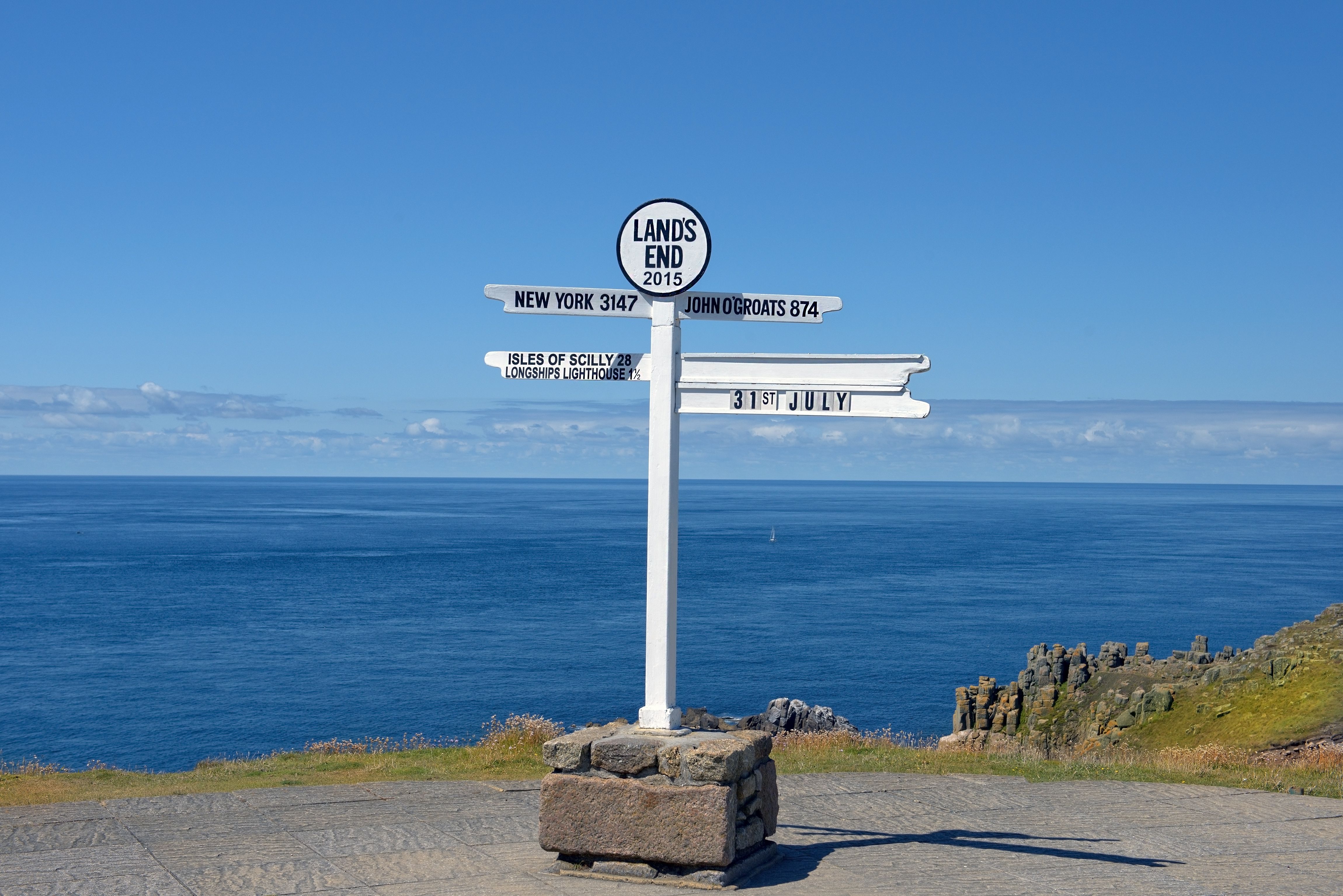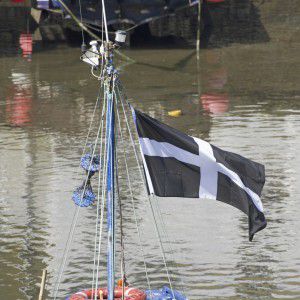Saving the Cornish language: Kernewek Fights Back!
Kernewek in Kernow
When I was back home the other week, I was surprised to see the Cornish language supporters out in force at several major Maytime festivals. Back in the day, you wouldn’t tend to see much Cornish language at a public parade. In fact, back in the day, you could easily come to Cornwall and miss all the Celtic language completely, except for the odd place-name translated on road signs.
Not so now! I go to a festival in London every year where all the Cornish ex-pats gather to celebrate St Piran’s Day, and at this festival of modern music and comedy (no folk element to it), it’s very normal for the presentation to be at least partly in Cornish. Last year, at the Falmouth Sea Shanty Festival, an entire group of about 20 people came into one of the pubs and were talking exclusively in Cornish, albeit with varying levels of fluency. And most Cornish people nowadays are at least familiar with the essentials- Mitten Da, Nos da, pasti, Fatla Genes, Kernewek.
Putting Kernow back on the map!
So something’s happened between when I was at school and now. And in large part it’s down to the Cornish Language Partnership, who have been promoting and supporting the Cornish language since 2005, coordinating languages societies, local authorities and other cultural groups. It also offers a translation service and online audio dictionary for all those eager learners. They’ve put Cornish back on the map in a big way, and helped to standardise a language which, divided into many dialects, was actually officially dead.
The bad news is that the Cornish Language Partnership relies a lot on government funding, and the government has recently cut £150,000 of annual funding for the Cornish language. This is terrible news for supporters of Cornish (and worrying news for other minority languages), and a petition has been launched to reinstate the funding (with currently over 8,600 signatures).

Not taking it lightly, me lovers!
The good news is that Cornwall’s not backing down! A local (and well-loved) ice cream firm, Kelly’s, has recently launched an advert all in Cornish (with the odd cheeky nod to English thrown in here and there). In the Kelly’s ad, a young man extolls all the virtues of the Kelly’s ice cream entirely in Kernewek – quite ambitious considering Cornwall only boasts about 2000 fluent speakers – yet the simple message of this ad is completely conveyed. Have a look for yourselves:
We’re proud to do our bit to support the Cornish language – check out our Cornish programs
Nat
Tell us about your Tartan…
We were disappointed recently to find that – somehow – we had missed National Tartan Day. I know! We’ll do better next year.
Although you might think National Tartan Day is a Scottish endeavour, it actually stems from North America and seems to have developed into rather a massive Celtic festival. Which leads us to wonder, what exactly is tartan and why is it so important?
When we think of tartan, we generally think of a woven patterned cloth which belongs to a particular Scottish clan. Most clans will tend to have both a dress and hunting tartan, the hunting tartan being a sombre version made up of dark colours whilst the dress usually swaps a colour from the pattern out for white, making it much brighter. There is a lot of etiquette around tartan, and I for one would not try to wear a tartan that I had no connection with, sticking instead to the tartans from my family’s history.
Or, I might wear a Cornish tartan, because in recent times tartan has become increasingly used by regions, ethnicities and businesses. Cornwall’s tartan was created in the 1960s and has really caught on, being widely available on tourist knick-knacks and formal clothing. At a wedding I recently attended, the groom and best men were all wearing Cornish tartan waistcoats, and the Cornish tartan kilt is not an unusual site at a festival. What is perhaps especially nice about this regional tartan is that anyone Cornish is entitled to use it- there’s no difficulty in etiquette- and even if you’re not Cornish but want to celebrate Cornwall, you’re more than welcome to help yourself to some Cornish tartan, as long as you can stand the slightly weird and bright mustard yellow of it…

If you want to wear tartan but don’t really feel a particular affiliation with a particular clan, then a good option for British and Commonwealth citizens is the Hunting Stewart tartan which, being Queen Elizabeth II’s personal tartan, can be used by all of her subjects. The other good option is Black Watch, also known as Government Tartan, which is traditionally available to those who don’t have a tartan of their own.
Do you have a particular tartan you wear, or thoughts on tartan etiquette? We’d love to hear from you!
Nat
Kernow Bys Vyken!
It’s not often you hear the Cornish language spoken in the streets of London. To be honest, it’s not often you hear it in the streets of Cornwall, although I promise it does happen, if you know where to look.
But this weekend was an exception, because Saturday was St Piran’s Day, the national day of Cornwall, and London was celebrating in style with its annual Shoreditch celebration, Kernow In The City.
So what’s it all about?
Drinking heavily!
No, I’m joking, of course – in fact, I find St Piran’s Day is one of the more sober Cornish celebrations, as it’s really more about celebrating the culture of Cornwall. Back home, different towns have different traditions, but usually there’ll be music and singing, a parade of some sort, perhaps some dancing and dressing up, occasionally a pasty competition. In Westminster, the Cornish MPs hold a cultural reception which aims to teach more about Cornwall’s identity and culture.
The Shoreditch evening event, which I’ve been going to for a good 4 or 5 years, is also primarily a cultural celebration, with different Cornish talent every year and a heavy focus on music (this year featured the amazing Flats and Sharps as the grand finale, last year saw The Oggymen taking centre stage), as well as a variety of comedians (The Kernow King has been guest of honour in the past, and still usually makes a remote appearance via video).
But get a lot of pining ex-pat Cornish together and a few kegs of Betty Stogs beer and it will inevitably turn into a somewhat tipsy affair, with plenty of drunken dancing by the end of the evening. And that’s part of the reason I love Kernow In The City: every year I take along a few non-Cornish people, who tentatively agree to attend in the full expectation of being hounded out of the venue for being English, and although some of the in-jokes about miniature Cornish villages do go over their heads, and the bilingual compering leaves plenty to be understood, by the end of the evening they’re usually bellowing out the words to Trelawney (our national anthem) with great passion, and dancing with total strangers.
Nothing could do more to dispel the myth of the Cornish cold shoulder than the St Piran’s Day event: take a small interest in Cornish culture and you really will be welcomed with open arms. Learn a couple of words of Cornish and you’ll be the talk of the town. And if you’re going to learn anything, learn these three words: Kernow Bys Vyken (Cornwall For Ever), a toast to make you Cornish friends for life.
Proper job!
Nat
Way, Haul Away… Sea shanties and language learning
Last weekend, I spent a very merry, slightly tipsy few days at the International Sea Shanty Festival in Falmouth.
International What, now? Allow me to explain.
 Every year, Falmouth town hosts a three-day festival of nautical songs and chants, to which people flock not only from all over Cornwall, but from foreign parts too – Ireland, Brittany, England, even America. Every B&B, campsite and hotel is full to the brim with shantymen (and, increasingly, some shantywomen!), and the streets swarm with be-smocked musicians and the occasional pirate. Nearly every pub (of which Falmouth has a very generous range) becomes a venue for the various shanty bands, who also play on street corners, outside shops and in the public squares.
Every year, Falmouth town hosts a three-day festival of nautical songs and chants, to which people flock not only from all over Cornwall, but from foreign parts too – Ireland, Brittany, England, even America. Every B&B, campsite and hotel is full to the brim with shantymen (and, increasingly, some shantywomen!), and the streets swarm with be-smocked musicians and the occasional pirate. Nearly every pub (of which Falmouth has a very generous range) becomes a venue for the various shanty bands, who also play on street corners, outside shops and in the public squares.
Each hour, a venue’s lineup changes, and you’ll see canvas smocks in Breton red, navy blue and stripes scurrying from one establishment to another as they get ready to set up for their next gig. Every year, I make elaborate plans to switch venue every hour to see all the bands I want to see, but inevitably the beer in one pub ends up being unusually good, and a seat becomes vacant, and 7 hours later you find that somehow you’re still in the same venue and 7 different bands have floated on and off stage before your eyes, whilst old-timers have come and shared your table and had a natter about… well, everything under the sun. Which is all very much in the spirit of the festival.
So what is a shanty?
Most people think the name ‘shanty’ comes from the French ‘chanter’ (to sing). Although there’s some debate about this, what’s definite is that a shanty is a traditional form of song sung by sailors, which aims to reflect the rhythm of the work on deck (hauling halyards, pulling the anchor, setting jibs, winding a capstain). Often, a lead shantyman will give the ‘call’ and then the other crew will give the ‘response’ (short, sharp calls and responses for the jobs requiring bursts of energy; longer, more lyrical ones for the slower jobs). Working shanties often feature the nature of the work itself as the main theme – ‘Haul Away Joe’, ‘Wey, hey, blow the man down!’ – but for those lonely evenings or periods of comparative calm, there are the wistful shanties which recall the shore and all its comforts – ‘Spanish Ladies’, ‘Maggie May’ – and remind the young sailors of their sweethearts left behind (often including a not-so-veiled warning about what said sweethearts are most likely getting up to with other boys whilst their sailors are at sea).
Who sings shanties nowadays?
There are plenty of shanty bands around the country – and the world. This weekend alone, I saw bands from Falmouth, Treverva, Salisbury (not a lot of sea in Salisbury, but there you go), Brittany, Exmouth, Holland, Poland, Yorkshire, and plenty more places. Some are professional groups with regular gigs of their own, whilst others are more casual affairs – people who just love to shant!
What’s all this got to do with language?
I’m glad you asked. The thing is that although shanties get sung in all sorts of languages and dialects, you never, ever feel left out by not understanding the words. Turn up to one of the Breton bands and (unless you speak Breton or Cornish), you probably won’t have a clue what the words mean, but you’ll definitely understand the spirit of it, and before long you’ll find yourself singing along to the chorus, arm in arm with everyone else. In part, this is because shanties are very repetitive by nature, so it’s easy to pick up on lyrics and sing along.
All of which makes me think that singing has got to be a great way to pick up a new language – and any type of song will do! Nursery rhymes, pop songs, national anthems, folk songs, poems, choral music, raps; it all helps, it really does. I still remember all the Zulu words to ‘Siyahamba’, which Safia and I learned over just a few days (video evidence below). And even if you don’t know exactly what all the words mean to begin with, it’s a huge encouragement to be able to fluently reel off a couple of sentences in your new language, all learned through song.
…Way, Haul Away,
We’ll Haul Away, Joe!
Nat
Time to say ‘Dyw genes’ to Poldark
I don’t know about you, but here at EuroTalk we’ve been very much enjoying the BBC’s latest Sunday night drama, Poldark. Set in the late 18th century, and based on the books by Winston Graham, it’s the story of Ross Poldark (Aidan Turner), who returns from the American War of Independence to find his father dead and the woman he loves engaged to his cousin. Poldark is an epic love story, with a suitably dashing hero, but it’s also a historical drama about the business and politics of the mining industry in south west England. I can’t speak for its accuracy, but it’s definitely very enjoyable…
Poldark is set on the beautiful coast of Cornwall, and with the series finale airing this weekend, we thought it was only right that we say an appropriate farewell. So whether you’ve always fancied learning a little Cornish, or, like us, you’re a fan of the lovely Ross, here’s your chance.
How did you do?
Want an opportunity to try out what you’ve learnt? Read Nat’s post on 10 reasons to visit Cornwall.
And if you haven’t had a chance to enjoy Poldark, and you’re wondering what all the fuss is about, check out the trailer.


